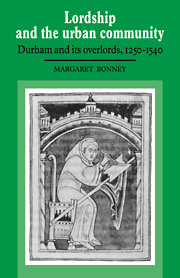Book contents
- Frontmatter
- Contents
- Acknowledgements
- List of abbreviations
- INTRODUCTION
- 1 URBAN ORIGINS: THE GROWTH AND DEVELOPMENT OF DURHAM TO 1250
- 2 THE URBAN LANDSCAPE OF DURHAM 1250–1540
- 3 DURHAM'S MEDIEVAL BUILDINGS
- 4 LANDLORD AND TENANTS: THE ECONOMIC RELATIONSHIP BETWEEN DURHAM PRIORY AND ITS URBAN TENANTS IN THE LATER MIDDLE AGES
- 5 TRADES AND OCCUPATIONS
- 6 LORDSHIP IN ACTION: THE MAINTENANCE OF LAW AND ORDER IN LATE-MEDIEVAL DURHAM
- CONCLUSION: LORDSHIP AND COMMUNITY: THE RELATIONS BETWEEN DURHAM AND ITS ECCLESIASTICAL OVERLORDS IN THE LATER MIDDLE AGES
- Appendix 1 Maps and plans of Durham
- Appendix 2 Tables
- Appendix 3 The dates of the bishops of Durham from 995 to the Dissolution
- Appendix 4 The obedientiaries of Durham Priory
- Appendix 5 The Durham courts
- Bibliography
- Index
6 - LORDSHIP IN ACTION: THE MAINTENANCE OF LAW AND ORDER IN LATE-MEDIEVAL DURHAM
Published online by Cambridge University Press: 06 January 2010
- Frontmatter
- Contents
- Acknowledgements
- List of abbreviations
- INTRODUCTION
- 1 URBAN ORIGINS: THE GROWTH AND DEVELOPMENT OF DURHAM TO 1250
- 2 THE URBAN LANDSCAPE OF DURHAM 1250–1540
- 3 DURHAM'S MEDIEVAL BUILDINGS
- 4 LANDLORD AND TENANTS: THE ECONOMIC RELATIONSHIP BETWEEN DURHAM PRIORY AND ITS URBAN TENANTS IN THE LATER MIDDLE AGES
- 5 TRADES AND OCCUPATIONS
- 6 LORDSHIP IN ACTION: THE MAINTENANCE OF LAW AND ORDER IN LATE-MEDIEVAL DURHAM
- CONCLUSION: LORDSHIP AND COMMUNITY: THE RELATIONS BETWEEN DURHAM AND ITS ECCLESIASTICAL OVERLORDS IN THE LATER MIDDLE AGES
- Appendix 1 Maps and plans of Durham
- Appendix 2 Tables
- Appendix 3 The dates of the bishops of Durham from 995 to the Dissolution
- Appendix 4 The obedientiaries of Durham Priory
- Appendix 5 The Durham courts
- Bibliography
- Index
Summary
Although Durham was a town dominated by its religious communities, in the same way as its more secular counterparts it was equally in need of firm government and even-handed justice to restrain the excesses of its citizens and to arbitrate in their disputes. Late-medieval Durham never experienced civil unrest as severe as the rioting at, for example, Coventry or Beverley; nor did the legal battles between the town and its ecclesiastical overlords ever reach the proportions they did in Bury St Edmunds, Norwich or York. Nonetheless, the whole structure of town life was shaped by regulations or restraints on townsmen and outsiders; and at some stage in their lives it is probable that almost all of the inhabitants had to appear before one of the many courts operating in medieval Durham. The administration of the law touched most aspects of a townsman's life, public or private, and it was enforced rigorously and persistently by the town's overlords.
Medieval urban society was permeated with this concern to uphold law and order, for three main reasons. First, and most obviously, there was a need to maintain peace between individuals or groups wherever there was a concentration of people living and working together. A town depended for its life on its work-force, its industries and its trade; internal troubles could lead to the collapse of industries, the discouragement of outside traders and a reluctant work-force.
- Type
- Chapter
- Information
- Lordship and the Urban CommunityDurham and its Overlords, 1250–1540, pp. 195 - 228Publisher: Cambridge University PressPrint publication year: 1990



